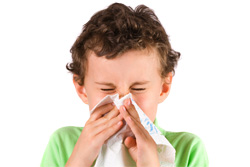The notion of a child with a runny nose is almost one of those clichéd visions we have of childhood. Dr Joe Kosterich talks about runny noses, including why we have mucus in our noses, what causes runny noses and how to treat them.
 The nose produces mucus, and it’s a useful thing for us. It’s part of the body’s defensive and protective mechanism. When the nose produces mucus, it can trap dust, bacteria, viruses and a whole range of other things that we don’t really want within our body and within our lungs. So it serves a useful purpose.
The nose produces mucus, and it’s a useful thing for us. It’s part of the body’s defensive and protective mechanism. When the nose produces mucus, it can trap dust, bacteria, viruses and a whole range of other things that we don’t really want within our body and within our lungs. So it serves a useful purpose.
Like a lot of things with the body, though, if there’s a little bit too much, it can be a nuisance. If the nose produces excess mucus, then it’s going to run somewhere. The way the nose is designed, the mucus can run in one of two directions: it can run forwards, giving us the classic runny nose; it can run backwards, giving us a tickle at the back of the throat and sometimes catarrh and a feeling of needing to clear the throat.
For reasons that I don’t think anybody’s quite worked out, a runny nose is more common in children than in adults. Similar to causes for a cough, the most likely causes of runny nose in a child is some sort of virus or some sort of allergy.
Viruses in younger children are extremely common, and a runny nose is the hallmark symptom – probably more so than any other symptom. In most instances it will be a clear colour. If it is, that almost invariably tells you that it’s caused by a virus in the context of other cold-type symptoms: a bit of a cough, a big grizzly, off their food, that sort of thing.
A clear runny nose can also be a sign of allergies, and in that instance may be associated with watery eyes, or perhaps sneezing or itching. And, of course, the treatments are a little bit different.
If the nose is running a colour, particularly green, that may indicate an infection in the sinuses and it could be a bacterial-type infection. It’s more common in adults than in children, but it does occur in children. That’s one of the rare instances where an antibiotic can be helpful.
If the mucus is running a little bit yellow, that’s a little bit of a line ball and may be any one of the three. Your doctor can help you with sorting that out.
So what sort of treatments can we use for a runny nose?
Well, if it’s caused by a virus, it will pretty much need to run its course. What we call symptomatic or supportive measures are helpful: obviously clearing the child’s nose, helping them to blow their nose if they’re old enough to do that, is clearly going to be helpful. Some steam inhalation with or without some eucalypt can be soothing. There are a number of over-the-counter nasal sprays that can be used. Be very wary of ones that dry the nose – they really shouldn’t be used in children. Saline sprays – there are a few of those at the chemist – can be helpful. There are a number of decongestants that can be used but shouldn’t be used in children under 2, and they are not a cure.
For children who have allergy causing their runny nose, then an antihistamine can sometimes be used – that’s like a hay fever medicine – again, generally not in the very young age group. There are some prescription nasal sprays that have hydrocortisone in them. It’s a weak hydrocortisone, but it can reduce mucus production in the nose. These are something you need to talk about with your doctor.
Like with all things in medicine, there are rarer causes. Sometimes a runny nose in a child (particularly if it’s on one side) may be a sign that they’ve stuck something in their nose. Over the years, I’ve had cause to remove a few beads and other interesting objects that children have stuck up their noses. It’s uncommon; it happens, but it’s not common.
To sum up, a runny nose is almost as ubiquitous as childhood itself and is generally not a problem – a little bit of a nuisance, maybe not the thing you want when you’re about to have a photo taken of your child, but not generally serious. Simple symptomatic treatment will generally do the trick. If there are any concerns, then have your child seen by the GP and see whether or not there is anything else you need to be doing.
All content and media on the HealthEngine Blog is created and published online for informational purposes only. It is not intended to be a substitute for professional medical advice and should not be relied on as health or personal advice. Always seek the guidance of your doctor or other qualified health professional with any questions you may have regarding your health or a medical condition. Never disregard the advice of a medical professional, or delay in seeking it because of something you have read on this Website. If you think you may have a medical emergency, call your doctor, go to the nearest hospital emergency department, or call the emergency services immediately.







